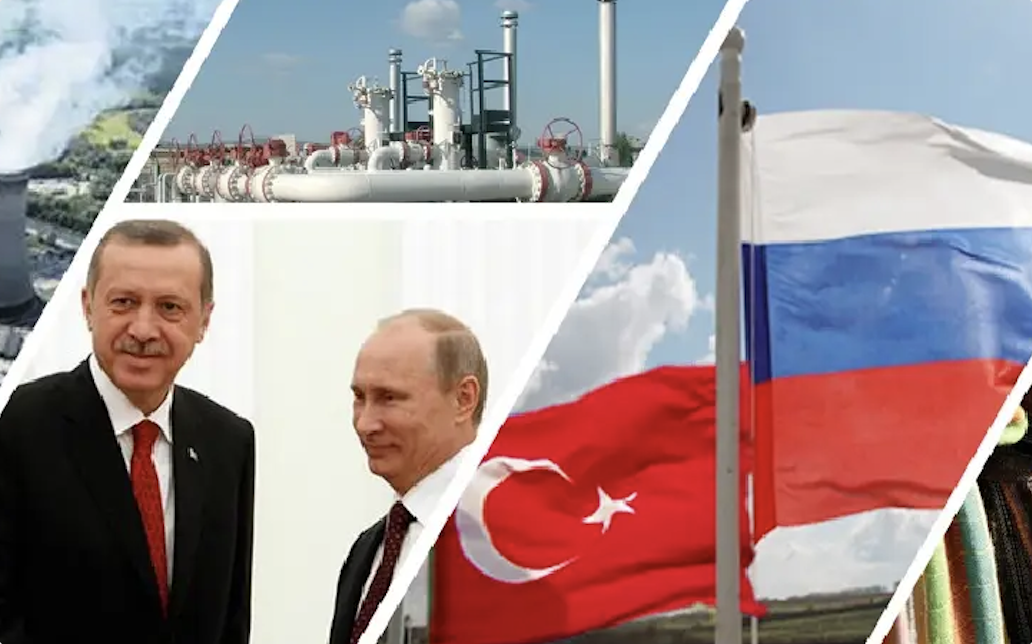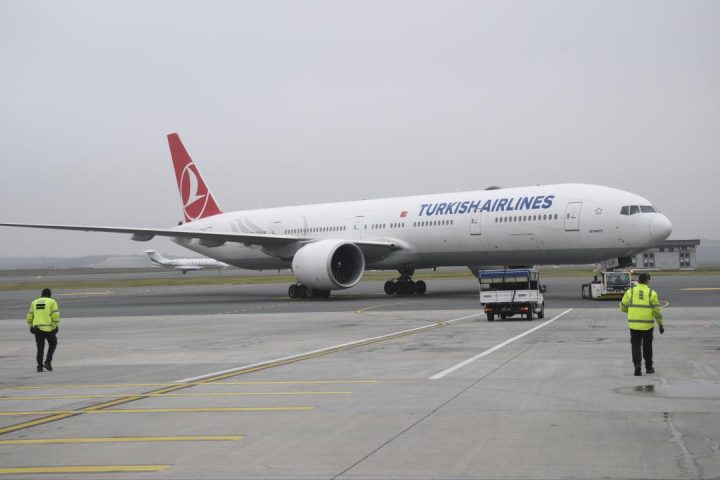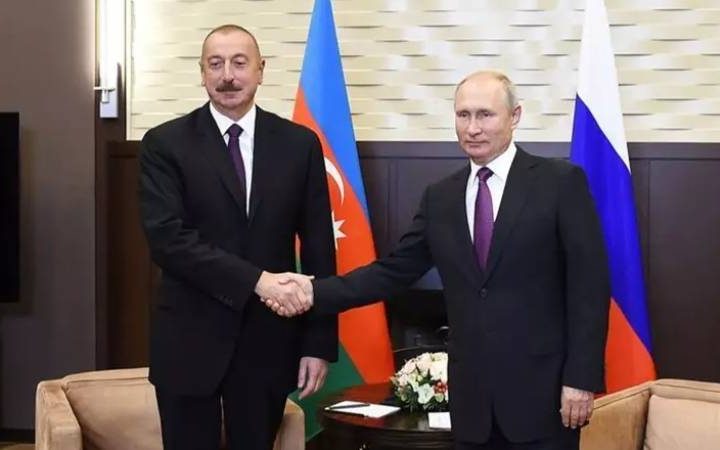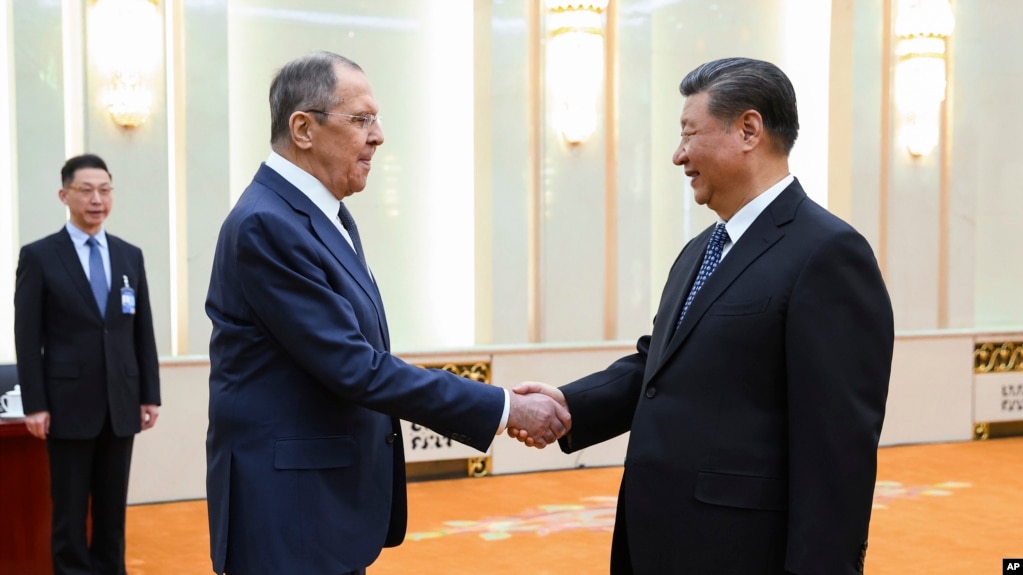Ankara and Moscow have a friendship pact dating back to the Bolshevik Revolution and the founding of the Republic. As I have mentioned before, even in the harshest days of the Cold War, Ankara and Moscow did not confront each other, on the contrary, they worked hand in hand to transfer the technology that enabled Turkey’s development. Demirel himself realized Erbakan’s dream of factories building factories by cooperating with the Russians. Now this rapprochement is being crowned with energy deals.
In the Caspian Basin, which is more like a small ocean or an inland sea than a lake, Turkey is pursuing a strategy of influence through Azerbaijan. It is not possible for Russian intelligence and foreign affairs not to know Turkey’s intentions and actions towards Eurasian geopolitics. Likewise, there is what can be called an implicit Russian-Turkish agreement in the Red Sea.
read more:
- Political ecology and NATO in the Caspian basin
- Putin’s Vision for the Middle East: Security, Economy and Strategic Cooperation-1
The presence of a Russian military base in the Red Sea region, near the port of Port Sudan, has been discussed in the Western media. This naval base allows Moscow to extend its sphere of influence to the Indian Ocean. It also makes Russia an important geostrategic actor in the Red Sea region.
Russia thus has a military presence in the Indian Ocean and a presence in the Suez Canal, where 10 percent of the world’s maritime trade takes place. The fact that Sudan borders Libya, Chad and Egypt also increases Russia’s sphere of influence.
Russia has a naval base in the Mediterranean Sea in the Syrian port of Tartus. The discovery of hydrocarbon deposits in the Eastern Mediterranean has increased the importance of this naval base. Russia already has close cooperation with many of the regional countries in the Eastern Mediterranean. In March 2021, the Kremlin signed an energy agreement with the Syrian government, sending a message that it is part of the international competition in the Eastern Mediterranean energy field. Russia’s military presence in Tobruk and Benghazi can be seen as a threat to NATO countries’ influence on the Mediterranean coast.
A different perspective on the Blue Homeland concept…
In the Eastern Mediterranean, our presence in Libya, which was briefly under British rule during the Second World War, is balanced and supported by Malta, another British colony. In other words, we are sanctioned.
We are developing the Blue Homeland concept, which expands, protects and strengthens British sovereignty in the Eastern Mediterranean, against Greece. However, in the end, what else but imposing the British position in the Mediterranean? Because Greek nationalists want the entire island of Cyprus. As you know, the Greek and Turkish presidents on the island are subject to a protocol list under the Colonial governor based in the British military zone.
They have also entrusted the protection of the Strait of Gibraltar and the Suez Canal, which connects the Mediterranean to the Red Sea via Cyprus and Malta, to the Turks. This is what they call “shooting the bird of the stream with the stone of the stream”. In the Gulf, Qatar is as close to us as Ankara is to London.
Long-legged yellow centipede invasion in the Black Sea
What is the UK’s announcement that it will lead a new coalition with Norway to provide Kiev with warships to support Ukraine’s naval capabilities? What does it mean other than adding fuel to the fire in the region?
“The UK, together with Norway, will lead a new coalition to provide ships and naval vessels that will strengthen Ukraine’s ability to operate in Black Sea waters,” the UK Ministry of Defense said in a written statement, adding that the coalition will provide Ukraine with long-term support, including training, equipment and infrastructure, to strengthen security in the Black Sea. But this is not so easy.
Russia’s ambassador to the UK, Andrey Kelin, says that the UK’s plans to create a naval coalition in the Black Sea to help Ukraine will be useless and will not seriously affect the situation in this region. Because of Ankara’s stance, London cannot send its ships to the Black Sea.
According to the ambassador, even British ships cannot enter the Black Sea due to the Montreux Convention, and the British authorities have previously tried to form a coalition of tanks and aircraft, but these attempts failed.
On December 18, the British newspaper The Daily Telegraph reported that Britain will sign a ten-year security agreement with Ukraine in the coming weeks, under which London will share naval expertise with Kiev against Russia.
There is no British navy in the Black Sea. However, the Russian Black Sea Fleet is primarily what naval strategists describe as a ‘fleet in existence’. This fleet represents a potential threat that needs to be kept under control for NATO and the UK, which want to dominate the Black Sea and Caspian Basin. Therefore, it needs to be kept there and suppressed.
The US is uncomfortable with Ankara’s cooperation with Moscow in the Black Sea…
The policies of the United States in the Middle East have a great influence on how Ankara positions itself in the Black Sea basin. This is often a policy of reaction. Turkey and Russia had and still have a shared vision of a regional order in the Black Sea that excludes external actors.
How Turkey interpreted the Montreux Treaty after the outbreak of the war in Ukraine and how the Black Sea Grain Initiative came into being is clear evidence of this.
The Montreux Treaty gives Ankara an important role in limiting extra-regional fleets in the Black Sea. On the one hand, this stems from Turkey’s control of the straits.
On the other hand, there are conventionally set tonnage limits for warships from extraterritorial states that are allowed to temporarily stay in the Black Sea. Ankara’s maneuvering contributes significantly to the West’s ambivalence about Turkey’s foreign policy orientation.
But Ankara does not question the security policy imposed by NATO. Ankara is interested in defending its economic interests as well as securing its leadership role in the Black Sea region. Ankara is keen to secure its leadership role in the Black Sea region as well as defend its economic interests.
Ankara does not allow NATO warships into the Black Sea, but for the time being it is also preventing the Russian fleet from leaving the Black Sea.
The Houthis provide justification for global imperialism!…
The Houthis, who have controlled most of Yemen since 2014, have vowed to continue firing missiles at Israel until Israel’s attacks on the Gaza Strip end. For many people this evoked the story of Abraham and the ant.
The story is as follows: Prophet Abraham, who is thought to be a Sumerian, preached to King Nimrod. Nimrod ordered Abraham to be burned in fire so that everyone could see what a powerful king he was.
They made a big pile of firewood in the square and set it on fire. It was such a big flame that it rose up to the clouds. All the animals were afraid of the fire and ran away.
Nimrod’s soldiers were going to throw Prophet Abraham into the center of the fire with a catapult.
Meanwhile, an ant was hurrying towards the fire that reached up to the sky with a tiny drop of water in its mouth. Another ant saw him in such a hurry and asked him:
– Where are you going in a hurry?
The ant, hurrying to catch up, took a drop of water in his mouth between his hands and replied:
– Don’t you know? Nimrod is going to throw Prophet Abraham into the fire. I’m taking water to the square where the fire is.
The other ant laughed and said:
– Don’t you know about the great fire that burns? Have you never looked at it? How big it is, what can your drop of water do to it?
An ant carrying a drop of water:
– Well, at least it’s clear which side I’m on.
But unfortunately, in real life, things don’t work in a parable format. The outcome matters.
Who says that missiles fired in the name of Allah to avenge the oppressed people of Gaza, or the seizure of ships carrying supplies to Israel, justify global imperialism’s control of the world?
These Iranian-backed Houthis, whether you call them “a thorn in the US navy’s side” or “buttering its bread”, believe me, they are doing more than that. The threat to local maritime security has been growing over the last few years, and the Hamas-Israel war has magnified it.
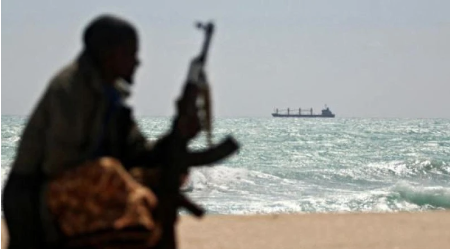
Previously, the Houthis targeted ships linked to countries participating in the Saudi-led coalition war in Yemen. Initial reactions from marine insurance underwriters and shipping companies suggest that the recent Houthi attacks have affected the industry’s decision-making on vessels with Israeli connections.
The Houthis are using a wide range of weapons and tactics to increase the deterioration in regional maritime security, imposing a selective sea blockade against Israeli ships seeking passage through the strait and threatening US warships that show up to protect them; securing Bab el-Mandeb and its surrounding waters is key to ensuring the unimpeded passage of trade across the region, including in the Gulf of Aden, one of the world’s busiest shipping lanes.
The US closes the routes to the main seas on the pretext of Israeli security…
Ambrey, a risk management firm founded in 2010 to provide safety, security, maritime and risk management services to the Shipping, Oil & Gas and Offshore sectors, to deliver a dynamic and creative solution that puts the needs of clients first, last month advised ship owners to check whether their vessels have been owned or managed by Israeli-linked companies in the last year.
According to the latest maritime data, Houthi attacks on commercial vessels in the Red Sea, especially those linked to Israel, have prompted some companies to divert their ships away from the Suez Canal and the strategic Bab el-Mendeb crossing point.
Such ships have been observed to take a longer route around the Cape of Good Hope to reach Europe and Asia, increasing transit times. While attacks originating from Houthi-controlled areas of Yemen have so far been contained, the risk of major disruptions to global trade will remain high as long as commercial vessels of various nationalities are targeted.
So while the impact of the Red Sea attacks appears to have been limited so far, the risk of an escalation or miscalculation that could create deeper trade shockwaves cannot be ruled out. Protecting colonial freedom of navigation in this waterway is important for energy security and the overall global economy. Taking advantage of the situation, Washington declared the formation of an international alliance and launched a ‘cold war’ on this strategically important maritime corridor.
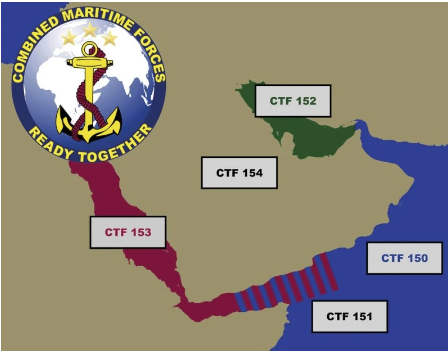
The US operation is under the control of the headquarters of Combined Task Force 153 (CTF 153), which was created to resolve the problems in the Red Sea and the Gulf. The operation is monitored by the Combined Maritime Forces (CMF), headquartered in Bahrain.
Bahrain, the UK, Spain, Italy, Canada, Canada, the Netherlands, Norway, Seychelles and France are directly participating in the operation. The leader of the coalition is the naval superpower represented by the United States, the French, British, Italians, Spaniards, who make up the largest NATO fleets.
Countries with lesser capacities but considerably stronger at sea include Norway and the Netherlands, as well as the Seychelles and Bahrain, in which case their role is mainly to provide bases and deployment areas.
The unit’s headquarters was established in April 2022 and consists of 15 officers from the CMF with a rotating change of command; so far, in the past year and a half, the headquarters has been controlled twice by American admirals, and once by Egyptian. Given the operating principles of such formations in the US Navy, such groups usually control the forces assigned to them by a higher headquarters within the boundaries of their assigned area of operations.
In this case, such a headquarters is the naval headquarters of the US Armed Forces Central Command (Naval Forces Central Command), also known as the headquarters of the 5th Fleet. Its commander, Vice Admiral Brad Cooper, also leads the Joint Maritime Forces.
It controls all US Navy and Coast Guard forces in the region, as well as the allied forces allocated to them within the CMF. “Operation Welfare Guardian,” which was announced on December 18 in response to Houthi attacks on commercial vessels in the Red Sea, is supposed to be for defense and patrol purposes only.
The presence of many naval powers and military bases on the African continent raises concerns about ‘military alliances’ in the Red Sea, the lifeblood of global trade and a strategic corridor that ‘attracts growing international interest and competition’.
During a visit to Bahrain, US Defense Secretary Lloyd Austin announced the formation of an international military alliance of 10 countries to counter Houthi attacks in the Red Sea targeting ships they believe are linked to Israel. Austin said the alliance would work “to ensure freedom of navigation for all countries and promote regional security and prosperity.” The alliance includes the United States, Britain, Bahrain, Canada, France, Italy, Italy, the Netherlands, Norway, Seychelles and Spain.
By controlling the Red Sea and the Persian Gulf, the US and its allies are suppressing Russia in the inland seas and preventing it from reaching the big seas. In addition, despite a historically strong relationship with China, China’s decline in oil imports from Iran is worrying, making negotiations more difficult.
Another objective of this operational force is to prevent the People’s Republic of China’s naval ships from entering and leaving the Red Sea, especially to suppress the Iranian navy. It can be explained as keeping Russia away from the main sea lanes and strangling it.
Do not read the terrorist attack on Turkish soldiers in isolation from all this. The US wants to punish Turkey in its mind. But there is one thing these cowherds forget; God is one and his army is Turkish.
We received the news of 12 martyrs in two days. Sadly, TV channels did not interrupt their magazine programs. Entertainment programs and music programs continued. Even football league matches were not postponed. Shame on them.
Selected Bibliography
https://www.rand.org/
https://www.swp-berlin.org/publikation/die-tuerkei-im-schwarzmeerraum
https://www.dikgazete.com/yazi/hazar-havzasinda-politik-ekoloji-ve-nato-6363.html
https://www.chathamhouse.org/2019/02/why-irans-oil-export-industry-under-pressure
https://www.washingtoninstitute.org/policy-analysis/houthi-ship-attacks-are-affecting-red-sea-trade-routes
https://turkish.aawsat.com/dünya/4740011-kızıldenizdeki-askeri-ittifaklar-amaç-seyrüsefer-güvenliği-mi-yoksa-yaklaşan
https://tr.euronews.com/2023/12/22/pentagon-kizildenizde-husilere-karsi-kurulan-uluslararasi-guce-20den-fazla-ulke-katilacak
https://sputniknews.com.tr/20231219/ingiltere-karadenizin-kontrolu-icin-kieve-yardima-hazirlaniyor-1078590437. html
https://tr.euronews.com/2023/12/22/pentagon-kizildenizde-husilere-karsi-kurulan-uluslararasi-guce-20den-fazla-ulke-katilacak
https://sputniknews.com.tr/20231222/rus-buyukelci-ingiltere-turkiyenin-tavri-sebebiyle-karadenize-gemi-gonderemeyecek-1078717832.html
https://sputniknews.com.tr/20231211/ingiltere-ve-norvecten-tehlikeli-hamle-karadenizde-ukraynaya-destek-icin-koalisyon-kuruluyor-1078303870.html
https://www.imemo.ru/publications/policy-briefs/text/fight-at-the-gates-of-sorrow-can-the-united-states-stop-attacks-on-merchant-ships-in-the-bab-el-mandeb-strait-and-surrounding-waters

